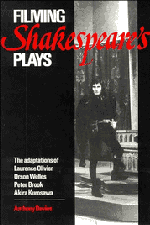 Filming Shakespeare's Plays
Filming Shakespeare's Plays Book contents
- Frontmatter
- Contents
- List of illustrations
- Preface
- Acknowledgements
- Introduction
- 1 Theatrical and cinematic space
- 2 Laurence Olivier's HENRY V
- 3 Laurence Olivier's HAMLET
- 4 Laurence Olivier's RICHARD III
- 5 Orson Welles's MACBETH
- 6 Orson Welles's OTHELLO
- 7 Orson Welles's CHIMES AT MIDNIGHT
- 8 Peter Brook's KING LEAR and Akira Kurosawa's THRONE OF BLOOD
- 9 The film actor
- Conclusion
- Notes
- Select filmography
- Bibliography
- Index
4 - Laurence Olivier's RICHARD III
Published online by Cambridge University Press: 01 June 2011
- Frontmatter
- Contents
- List of illustrations
- Preface
- Acknowledgements
- Introduction
- 1 Theatrical and cinematic space
- 2 Laurence Olivier's HENRY V
- 3 Laurence Olivier's HAMLET
- 4 Laurence Olivier's RICHARD III
- 5 Orson Welles's MACBETH
- 6 Orson Welles's OTHELLO
- 7 Orson Welles's CHIMES AT MIDNIGHT
- 8 Peter Brook's KING LEAR and Akira Kurosawa's THRONE OF BLOOD
- 9 The film actor
- Conclusion
- Notes
- Select filmography
- Bibliography
- Index
Summary
What makes Olivier so remarkable and significant a director of Shakespearean film is the sense in which his approach to the aesthetics of filming theatrical material is paradoxical. His concept of the nature of dramatic action is, as we have seen, essentially and unwaveringly theatrical. Yet his films abound with those moments which bring theatricality to the film and then advance its impact in a way which only cinema can. The relationship between film and theatre – in which cinema would seem to be subservient – is suddenly and unexpectedly subverted so that the entire medium of expression is ultimately cinematic.
It is possible to postulate the general features of Olivier's approach to the filming of Shakespearean material by pointing to conceptual similarities in his three Shakespeare films. Yet it becomes clear that within this broad framework he relates his cinematic strategy to the specific potential which each individual play offers.
Two instances of his overall approach come readily to mind: his perception that cinema is essentially narrative, and his visualization of a cyclical journey structure in each of his three films. Within these two broad strategies, the differences are, however, very clear. In Henry V the narrative function which the Chorus performs for the play is gradually conceded to the camera.
- Type
- Chapter
- Information
- Filming Shakespeare's PlaysThe Adaptations of Laurence Olivier, Orson Welles, Peter Brook and Akira Kurosawa, pp. 65 - 82Publisher: Cambridge University PressPrint publication year: 1988


